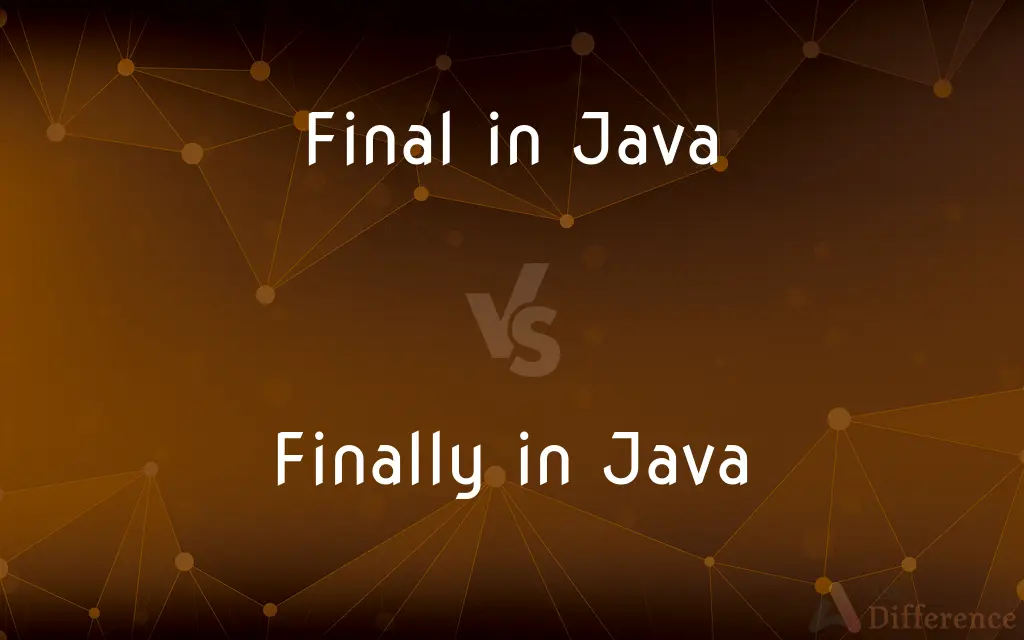Final in Java vs. Finally in Java — What's the Difference?
By Tayyaba Rehman & Urooj Arif — Published on January 31, 2024
In Java, 'final' is a keyword to declare constants or prevent inheritance and overriding, while 'finally' is a block that executes code regardless of exceptions.

Difference Between Final in Java and Finally in Java
Table of Contents
ADVERTISEMENT
Key Differences
'Final' in Java is used to define an entity that cannot be later modified. It can declare variables as constants, methods that cannot be overridden, and classes that cannot be subclassed. Conversely, 'finally' is a block in exception handling that executes code after a try-catch block, regardless of whether an exception occurred or not.
When a variable is declared with 'final', its value cannot be changed once initialized, making it effectively a constant. On the other hand, a 'finally' block is used to execute important code such as closing resource connections, irrespective of whether an exception was thrown or caught.
'Final' can be applied to methods, ensuring they cannot be overridden by subclasses, which is essential for maintaining a certain behavior of the method. 'Finally' ensures that certain code segments are executed even if an exception is thrown, which is crucial for resource management and avoiding resource leaks.
In the context of class declaration, using 'final' prevents a class from being inherited, safeguarding your class from alteration through inheritance. In contrast, 'finally' does not relate to class inheritance or method overriding but is a key tool for robust exception handling and resource management.
'Final' provides a means to define unchangeable references, safeguarding the integrity of your data and behavior of your classes and methods. Whereas 'finally' provides a safety net for ensuring certain actions are always executed, such as cleaning up resources, regardless of how the try and catch blocks are exited.
ADVERTISEMENT
Comparison Chart
Usage
Declare constants, prevent method overriding, and class inheritance
Execute code after try-catch block regardless of exceptions
Scope
Variables, methods, classes
Within exception handling blocks
Purpose
To create unmodifiable values, methods, and classes
To ensure execution of essential code
Relation to Exceptions
None
Integral part of exception handling
Example Use
Final int MAX_VALUE = 10;
Finally { closeResource(); }
Compare with Definitions
Final in Java
Prevents method overriding in subclasses.
Final void display() { /* code */ }
Finally in Java
Follows try-catch blocks in exception handling.
Try { /*...*/ } catch(Exception e) { /*...*/ } finally { /*...*/ }
Final in Java
Ensures the integrity of values or behaviors in the code.
Public void calculate(final int base) { /*...*/ }
Finally in Java
Used for cleanup activities, like closing files or connections.
Finally { file.close(); }
Final in Java
Disallows class inheritance.
Public final class ImmutableClass { /*...*/ }
Finally in Java
Executes code irrespective of whether an exception is thrown.
Finally { System.out.println(Executes regardless of exception); }
Final in Java
Creates a read-only reference to an object.
Final MyClass obj = new MyClass();
Finally in Java
Functions independently of whether the catch block was entered.
Finally { resetVariables(); }
Final in Java
Declares a constant; the variable's value cannot be changed.
Final int MAX_SPEED = 120;
Finally in Java
Guarantees the execution of important code segments.
Finally { releaseResources(); }
Common Curiosities
Is the 'finally' block always executed?
Yes, the 'finally' block is executed irrespective of whether an exception is caught or not.
What is 'finally' in Java?
'Finally' is a block in Java that executes code after a try-catch block, regardless of whether an exception is thrown.
Can methods in a final class be overridden?
No, methods in a final class cannot be overridden.
What happens if an exception is thrown in a finally block?
If an exception is thrown in a finally block, it must be caught or declared to be thrown.
Does a final method improve performance?
Yes, final methods can lead to minor performance improvements due to easier optimization.
What is 'final' in Java?
'Final' is a keyword used to declare constants, prevent method overriding, and class inheritance.
Can a final variable be modified?
No, once a final variable is initialized, its value cannot be changed.
Is it mandatory to have a catch block before a finally block?
No, a finally block can follow a try block directly without a catch block.
What is a common use of a final variable?
A common use is to define constants.
Can we have a try block without a catch or finally block?
No, a try block must be followed by either a catch or a finally block, or both.
Can finally block be used without a try block?
No, a finally block must be associated with a try block.
Can a final class be extended?
No, a final class cannot be subclassed.
Can a final variable be inherited?
Yes, a final variable can be inherited but cannot be overridden or changed.
What if there is a return statement in the try and finally blocks?
The return statement in the finally block will override any return statement in the try block.
Is it good practice to use finally for cleanup activities?
Yes, using finally for cleanup activities like closing resources is a recommended practice.
Share Your Discovery

Previous Comparison
British Empire vs. Commonwealth
Next Comparison
Amino Acid vs. Imino AcidAuthor Spotlight
Written by
Tayyaba RehmanTayyaba Rehman is a distinguished writer, currently serving as a primary contributor to askdifference.com. As a researcher in semantics and etymology, Tayyaba's passion for the complexity of languages and their distinctions has found a perfect home on the platform. Tayyaba delves into the intricacies of language, distinguishing between commonly confused words and phrases, thereby providing clarity for readers worldwide.
Co-written by
Urooj ArifUrooj is a skilled content writer at Ask Difference, known for her exceptional ability to simplify complex topics into engaging and informative content. With a passion for research and a flair for clear, concise writing, she consistently delivers articles that resonate with our diverse audience.











































